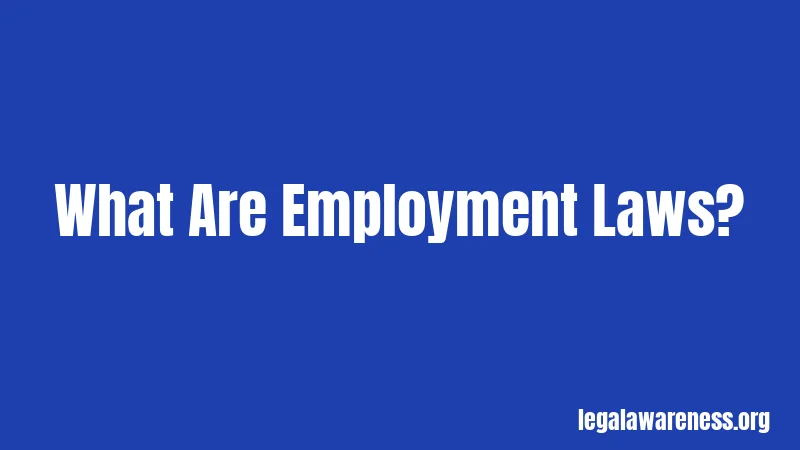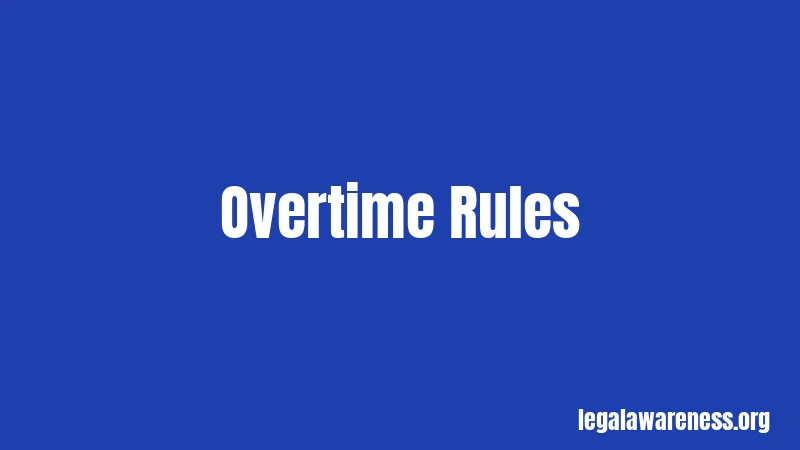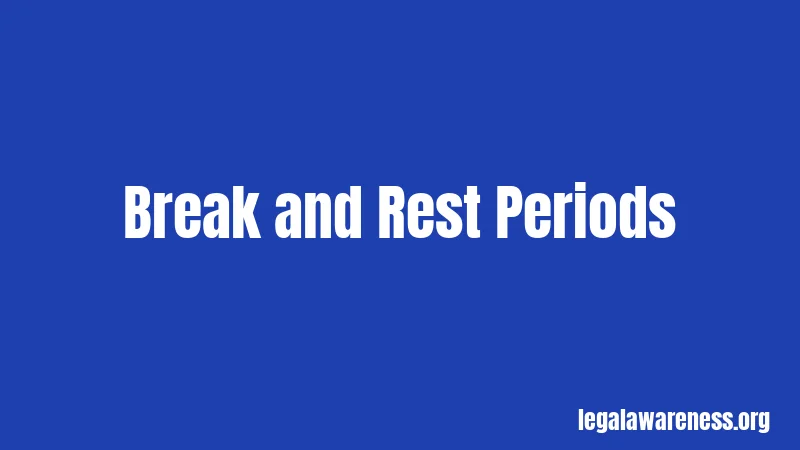Employment Laws in Wisconsin (2026): Your Complete Workplace Guide
Most people don’t realize how many rules protect workers in Wisconsin. Seriously. The state has dozens of employment laws covering everything from paychecks to discrimination. And if you’re working in the state right now, these laws affect you every single day.
Let’s break down exactly what you need to know about Wisconsin employment laws in 2026.
What Are Employment Laws?

Employment laws are rules that protect both workers and employers. They cover how much you get paid. When you get paid. Your right to take time off. Protection from unfair treatment.
Wisconsin has its own state laws. But federal laws also apply. Sometimes the rules overlap. When they do, whichever law gives you better protection wins.
Pretty straightforward, right?
Minimum Wage and Pay Requirements
Wisconsin’s minimum wage is $7.25 per hour. That’s the same as the federal minimum wage. This rate hasn’t changed since 2009.
The minimum wage applies to almost all workers. No matter how small the company is. Cities and counties in Wisconsin can’t set their own minimum wages higher than the state rate.
If you’re under 20 years old, there’s a special rule. Employers can pay you $5.90 per hour for your first 90 days. After that, you get the full minimum wage. This is called the “opportunity wage.”
Tipped Workers
Wait, there’s a different rule for tipped employees. If you work for tips, your employer can pay you $2.33 per hour. But here’s the catch. Your tips plus that hourly rate must equal at least $7.25 per hour. If they don’t, your employer has to make up the difference.
Basically, you’re guaranteed to make at least minimum wage no matter what.
Overtime Rules

Wisconsin follows federal overtime rules pretty closely. You get paid time-and-a-half for hours worked over 40 in a week. So if you normally make $15 per hour, you’d get $22.50 for overtime hours.
Not everyone qualifies for overtime though. Some jobs are exempt. Executive positions. Administrative roles. Professional jobs. Outside salespeople. These workers don’t get overtime pay.
Wondering if this applies to you? Check with your HR department.
When You Get Paid
Employers must pay you at least once per month. Paydays can’t be more than 31 days apart. Most companies pay more often. Weekly. Bi-weekly. Semi-monthly.
Your employer has to tell you when payday is. They have to stick to the schedule. If they change it, they need to give you notice.
Each paycheck needs to show specific information. Hours worked. Pay rate. All deductions. Your employer can use a coding system for this. But it has to be clear enough for you to understand.
Final Paychecks
Here’s where it gets important. When you leave a job, your employer must give you your final paycheck by the next regular payday. This applies whether you quit or got fired. The deadline is the next scheduled payday or within 31 days, whichever comes first.
There’s one exception. If the company closes, merges, or relocates, you must get paid within 24 hours.
Your final paycheck should include all earned wages. Any unpaid commissions. Unused vacation time if your company policy says you get it.
Break and Rest Periods

Hold on, this part surprises a lot of people. Wisconsin has no laws requiring breaks for adults. None. Your employer doesn’t have to give you lunch breaks or coffee breaks.
But wait. If your employer does give you breaks under 30 minutes, they have to pay you. Breaks 30 minutes or longer can be unpaid if you’re completely free from work duties.
For workers under 18, the rules are different. Minors must get a 30-minute meal break if they work six consecutive hours.
Honestly, this is the part most people get wrong.
Family and Medical Leave
Wisconsin has two separate leave laws. The federal Family and Medical Leave Act (FMLA). And the Wisconsin Family and Medical Leave Act (WFMLA). Both give you unpaid time off for certain reasons.
Who’s Covered
FMLA applies to employers with 50 or more employees. WFMLA also applies to employers with 50 or more employees.
You’re eligible for FMLA if you’ve worked for your employer for at least 12 months. You need at least 1,250 hours in the past year. And your workplace must have 50 employees within 75 miles.
For WFMLA, you need 52 consecutive weeks of employment. And at least 1,000 hours during that time.
How Much Leave You Get
Under FMLA, you can take up to 12 weeks per year. You can use it for your own serious health condition. To care for a family member with a serious health condition. For the birth or adoption of a child. Military family reasons.
WFMLA is different. You get up to 6 weeks for birth or adoption. Up to 2 weeks to care for a family member with a serious health condition. Up to 2 weeks for your own serious health condition.
Sound complicated? It’s actually not. You just need to know which law gives you more time off. That’s the one you use.
The leave is unpaid. But you can use vacation time or sick time if you want. Your health insurance continues while you’re on leave. You pay the same premiums you paid before.
Discrimination Protection
Wisconsin has strong anti-discrimination laws. The Wisconsin Fair Employment Act protects you from unfair treatment at work.
You cannot be discriminated against based on:
Age. Race. Color. Disability. Sex. Sexual orientation. National origin or ancestry. Religion or creed. Marital status. Arrest or conviction record. Military service. Honesty testing. Genetic testing. Use of lawful products off work premises.
This protection covers hiring. Firing. Pay. Promotions. Training. Job assignments. All conditions of employment.
Note that gender identity and expression are not currently protected under state law. However, some Wisconsin cities have added these protections locally. Madison and Milwaukee both protect gender identity.
Filing a Complaint
If you think you’ve been discriminated against, you have 300 days to file a complaint. That’s from the date of the discriminatory action. You file with the Equal Rights Division of the Department of Workforce Development.
Don’t wait too long. After 300 days, you lose your right to file.
The investigation can take time. Sometimes more than a year. If the Division finds discrimination, you can get back pay. Reinstatement. Attorney fees.
Workplace Harassment
Harassment based on protected characteristics is illegal. This includes verbal abuse. Offensive jokes. Unwanted touching. Creating a hostile work environment.
Your employer has a duty to stop harassment. If your boss knows about harassment and does nothing, the company can be held responsible.
You’re not alone, this confuses a lot of people. Harassment doesn’t just mean sexual harassment. It can be based on any protected characteristic. Race. Religion. Age. Disability.
At-Will Employment
Wisconsin is an at-will employment state. This means your employer can fire you at any time. For any legal reason. You can also quit at any time.
But wait. “At-will” doesn’t mean your employer can fire you for illegal reasons. They can’t fire you because of discrimination. Or for reporting safety violations. Or for taking family leave.
If you’re fired for an illegal reason, you can file a complaint or lawsuit.
Workers’ Compensation
Most Wisconsin employers must carry workers’ compensation insurance. This covers you if you get injured at work. Or if you develop a work-related illness.
Workers’ comp is required for:
Employers with 3 or more employees. Employers who pay at least $500 in wages per quarter. Farm operations with 6 or more employees on 20 days per year.
If you’re injured at work, report it immediately. Your employer should provide the proper forms. You might receive wage replacement benefits. Medical treatment coverage. Vocational rehabilitation.
You have up to 6 years to file a workers’ compensation claim.
Unemployment Insurance
Lost your job through no fault of your own? You might qualify for unemployment benefits.
You’re eligible if you were laid off. If your hours were severely reduced. If you had to quit for good cause. You must be able and available to work. Actively looking for a new job.
You can’t get benefits if you were fired for misconduct. Or if you quit without good reason.
Weekly benefit amounts vary. They’re based on your previous wages. Most people can collect for up to 26 weeks.
Child Labor Laws
Workers must be at least 14 years old in Wisconsin. Kids ages 12-13 can only work as newspaper carriers.
Anyone under 16 needs a work permit before starting work. Your school or the Department of Workforce Development issues these permits.
Minors have restricted work hours:
Ages 14-15 can work 3 hours per school day maximum. 18 hours per school week maximum. 8 hours per non-school day. 40 hours per non-school week.
Ages 16-17 have fewer restrictions. But they still can’t work during school hours.
All minors get a 30-minute meal break after 6 consecutive hours of work.
Right-to-Work Law
Wisconsin is a right-to-work state. This means you can’t be forced to join a union. Or pay union dues. Even if your workplace has a union.
You can still join a union if you want. Many workers do. But it’s your choice.
The right-to-work law passed in 2015. It only applies to private-sector workers. Public employees have different rules.
Workplace Safety
Wisconsin follows federal OSHA standards. Your employer must provide a safe workplace. They must follow safety regulations. Report serious injuries. Keep injury records.
If you see unsafe conditions, report them to your supervisor. You can also file a complaint with OSHA. Your employer cannot retaliate against you for reporting safety issues.
This one’s probably the most important rule. Safety violations can cause serious injuries or death.
Record Keeping Requirements
Your employer must keep accurate wage records. For at least three years. These records include hours worked. Wages paid. Deductions taken.
You have the right to see your employment records. Your employer must let you review your personnel file. You can request copies.
Retaliation Protection
Your employer cannot punish you for exercising your legal rights. This is called retaliation. It’s illegal.
Protected activities include:
Filing a discrimination complaint. Reporting wage violations. Taking family or medical leave. Reporting safety violations. Refusing to do something illegal.
If your employer retaliates, you can file a complaint. Retaliation itself is a separate violation. Even if your original complaint wasn’t valid.
Special Circumstances
Some employment situations have special rules. Independent contractors aren’t covered by most employment laws. Interns might not be either. Agricultural workers have different minimum wage rules.
Not sure what counts as a violation? The Department of Workforce Development has detailed guidance on their website. You can also consult an employment attorney.
Enforcement and Penalties
Wisconsin takes employment law violations seriously. Employers who break the rules face real consequences.
Wage violations can result in double damages. Discrimination violations can lead to reinstatement and back pay. Repeat violators face higher penalties.
You don’t need a lawyer to file most complaints. The state agencies can investigate for free. But complex cases might benefit from legal help.
Your Rights as an Employee
Let’s be clear about this. You have strong protections under Wisconsin law. You deserve fair pay. A safe workplace. Freedom from discrimination.
If something seems wrong at work, it probably is. Trust your instincts. Document everything. Keep copies of pay stubs. Save emails. Write down dates and details.
Many people assume they have no rights. They put up with illegal treatment because they don’t know better. Don’t be one of them.
Where to Get Help
If you have questions or need to file a complaint, contact:
Wisconsin Department of Workforce Development. Equal Rights Division handles discrimination and family leave issues. Labor Standards Bureau handles wage and hour issues.
The U.S. Equal Employment Opportunity Commission handles federal discrimination claims.
Most employment lawyers offer free initial consultations. Some take cases on contingency. This means you don’t pay unless you win.
Frequently Asked Questions
Can my employer fire me for no reason? Yes, Wisconsin is an at-will state. But they can’t fire you for illegal reasons like discrimination or retaliation.
Do I have to work overtime if my boss asks? Generally yes, unless you have a contract saying otherwise. But your employer must pay you time-and-a-half for overtime hours.
What if my employer won’t give me my final paycheck? File a wage claim with the Department of Workforce Development. They can force your employer to pay and might award penalties.
Can I be fired for taking family leave? No, if you’re eligible for FMLA or WFMLA. Your job is protected while you’re on approved leave.
How do I know if I’m an employee or independent contractor? It depends on many factors. Who controls how the work is done? Who provides tools and equipment? The Department of Workforce Development has guidelines.
Does my employer have to give me breaks? Not if you’re an adult. But if they give you breaks under 30 minutes, those must be paid.
What counts as discrimination? Treating someone differently in employment because of a protected characteristic. This includes hiring, firing, pay, promotions, and working conditions.
Can I sue my employer? Sometimes. You usually need to file with a state agency first. Some claims require administrative exhaustion before you can sue.
Do small businesses have to follow these laws? Most laws apply to all employers. But some have employee count requirements. Family leave laws apply to employers with 50 or more employees.
What if my employer makes me sign away my rights? You can’t sign away most employment law rights. Such agreements are generally not enforceable under Wisconsin law.
Final Thoughts
Wisconsin employment laws give you real protections at work. They ensure fair pay. Safe conditions. Freedom from discrimination.
Now you know the basics. Stay informed. Know your rights. When in doubt, ask questions or get help. These laws exist to protect you, so use them.
And remember, documentation is everything. Keep good records. Save everything important. If a problem develops, you’ll be glad you did.
